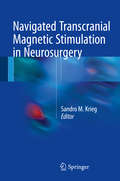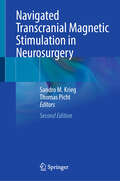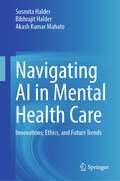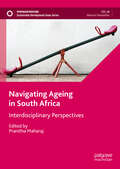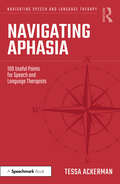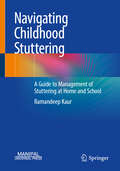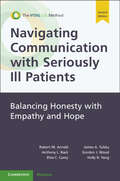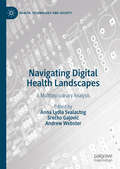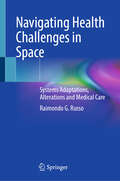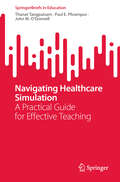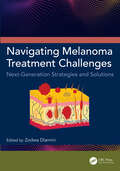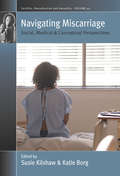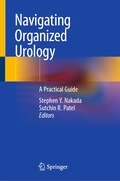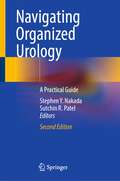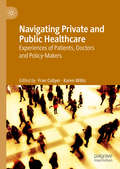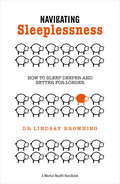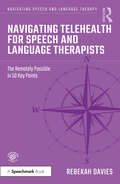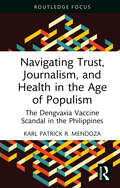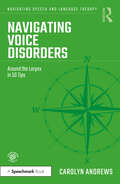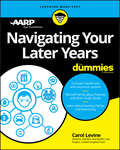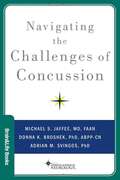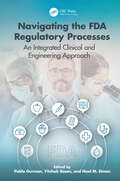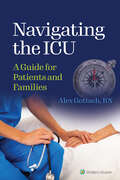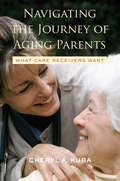- Table View
- List View
Navigated Transcranial Magnetic Stimulation in Neurosurgery
by Sandro M. KriegThis book is the first comprehensive work summarizing the advances that have been made in the neurosurgical use of navigated transcranial magnetic stimulation (nTMS) over the past ten years. Having increasingly gained acceptance as a presurgical mapping modality in neurosurgery, today it is widely used for preoperative mapping of cortical motor and language function, risk stratification and improving the accuracy of subcortical fiber bundle visualization. This unique work will provide neurosurgeons and neuroscientists who are starting their nTMS program essential and detailed information on the technique and protocols, as well as the current clinical evidence on and limitations of the various applications of nTMS. At the same time, more experienced nTMS users looking for deeper insights into nTMS mapping and treatment in neurosurgery will find clearly structured, accessible information. The book was prepared by an international mix of authors, each of which was chosen for their status as a respected expert on the respective subtopic, as evinced by their landmark publications on nTMS.
Navigated Transcranial Magnetic Stimulation in Neurosurgery
by Sandro M. Krieg Thomas PichtBuilding on the foundation of the first edition, this thoroughly updated volume reflects the rapid advancements and expanding clinical relevance of navigated transcranial magnetic stimulation (nTMS) in neurosurgery. Once primarily a tool for preoperative mapping of cortical motor and language functions, nTMS is now increasingly recognized as a versatile instrument for individualized neurosurgical planning, risk stratification, and targeted neuromodulation. This second edition presents these principles of perioperative neurophysiology with new insights into the integration of nTMS with cutting-edge technologies such as advanced tractography and connectomic analyses offering a more nuanced view of brain networks and their role in both mapping and therapeutic contexts. Emerging applications—such as closed-loop stimulation and post-spinal cord injury rehabilitation—are covered in depth, reflecting the field&’s shift toward personalized neuromodulatory interventions. As in the first edition, the book serves both as a practical guide and a reference: neurosurgeons and neuroscientists new to nTMS will find essential protocols and implementation strategies, while experienced users will benefit from expert analysis of the latest techniques and clinical applications. Each chapter is authored by leading figures in the field, selected for their pioneering contributions and international expertise. With a spirit of collaboration and innovation at its core, this book captures the momentum and promise of nTMS in modern neurosurgery—moving from isolated functional regions to a network-based approach that is transforming patient care.
Navigating AI in Mental Health Care: Innovations, Ethics, and Future Trends
by Susmita Halder Bibhrajit Halder Akash Kumar MahatoThis book on AI and mental health explores the intersection of AI and mental health care. It offers innovative strategies and tools to enhance mental health services. This book is structured to guide the reader through a journey of discovery and implementation, in terms of diagnosis, assessment, and management of mental health problems. It explores AI-driven diagnostic tools, illustrating how machine learning algorithms can identify patterns and predict mental health conditions. It highlights AI-assisted therapy and showcases examples of virtual therapists and chatbots for support and intervention. This book also tackles ethical considerations, demonstrating how an integrated AI upholds patient privacy and autonomy. With a focus on emerging trends, it reveals the transformative potential of AI in mental health care on a global scale. An indispensable resource for mental health professionals, researchers, and policymakers, this book provides a comprehensive understanding of how AI can optimize treatment plans, enhance diagnostic accuracy, and deliver personalized care.
Navigating Ageing in South Africa: Interdisciplinary Perspectives (Sustainable Development Goals Series)
by Pranitha MaharajThis book systematically explores the lives and varied experiences of older people in South Africa. Though a relatively youthful country, the share of the population aged sixty and above in South Africa is increasing steadily and is projected to reach 10% of the population by 2025. Population ageing is having major and far-reaching implications for a country with widespread poverty, changing household structures, a heavy burden of communicable diseases, and inadequate health infrastructure. Pandemics, such as HIV/AIDS and COVID-19, exacerbate many of the challenges faced by older people. Drawing on original research from national surveys and case studies, this book explores the various experiences and challenges of older people in their daily lives, such as their healthcare, social and family lives, their socio-economic status, mental health, and what it means to be an older person in South Africa today.
Navigating Aphasia: 100 Useful Points for Speech and Language Therapists (Navigating Speech and Language Therapy)
by Tessa AckermanNavigating Aphasia provides the reader with a starting point for working with people with aphasia; presenting key, practical points to consider in the clinical management of this client group. With a focus on both the language impairment and the consequences of aphasia, this book is packed with easily accessible, applied advice about assessment and therapy from an experienced aphasia clinician. Key sections include: • Understanding aphasia • Clinical management • Assessment • Approaches to therapy • Language and cognition • Living with aphasia.Concluding with an appendix featuring useful books, websites and professional organisations, this is an essential, practical and comprehensive guide for newly qualified and student speech and language therapists, as well as those new to the world of aphasia.
Navigating Childhood Stuttering: A Guide to Management of Stuttering at Home and School
by Ramandeep KaurThis book serves as a guide, covering stuttering from its development and treatment to relapse and recovery. In addition to discussing types and prevalence, it also explores various treatment techniques for children. The chapters address the emotional aspects of stuttering and integrate elements from speech therapy, cognitive and behavioral therapy, education, and occupational therapy, ensuring holistic care and understanding for both patients and caregivers. The book is supplemented with case studies of individuals who have overcome their stuttering. This book is relevant to occupational therapists, professionals, and students alike, offering insights and strategies for understanding, managing, and overcoming stuttering.
Navigating Communication with Seriously Ill Patients: Balancing Honesty with Empathy and Hope
by Robert M. Arnold Anthony L. Back Elise C. Carey James A. Tulsky Gordon J. Wood Holly B. YangWhen clinicians communicate effectively, patients retain more information, have higher trust and a better quality of life. Such a patient-centred approach is the future of clinical care, and this book is an essential how-to guide on improving these skills. Grounded in innovative and evidence-based methodology, perfected through over twenty years of teaching in the VitalTalk training program, content includes foundational communication skills, how to help patients plan for the future, what to do when you are really stuck, and strategies to work through conflicts with colleagues. In this updated edition, emphasis is placed on the roles privilege, race, and power play in the medical encounter, and new tools are provided to help clinicians navigate this landscape with greater self-awareness and sensitivity. This practical guide is filled with skills and roadmaps, demonstrating how to be clearer when sharing information, more competent at understanding patient concerns, and more effective when making recommendations.
Navigating Digital Health Landscapes: A Multidisciplinary Analysis (Health, Technology and Society)
by Andrew Webster Anna Lydia Svalastog Srećko GajovićNavigating Digital Health Landscapes explores how users navigate the internet when searching for health information. It is the first book to conceptualise the internet as a landscape and the ways in which people navigate this digital world, including the complex entanglements between on and offline domains. It does so through a range of disciplinary perspectives from expert contributors across STS (science and technology studies), social anthropology, biomedicine, ethics and law, linguistics, social policy and computer scientists working in more technical aspects of tracking and visualising data and information on the internet. The book provides a unique and valuable contribution for those wishing to understand how digital technologies are affecting the design, implementation and use of digital systems to manage health information in different contexts.
Navigating Health Challenges in Space: Systems Adaptations, Alterations and Medical Care
by Raimondo G. RussoThe book investigates the changes that the space environment causes on the human body and the challenges of living and working in space. It explores aspects such as weightlessness, radiation, and solar radiation, the impact on immune system, as well as the difficulties in meeting physiological needs, maintaining personal hygiene, and nourishment. The complex interactions of living conditions in space and how telecommunication technology can provide remote medical care are also analyzed. Furthermore, it examines the effects of space on various organs, exploring human limits and adaptations, and investigates the alterations in human physiology due to space conditions. This book is a tribute to the dedicated individuals who have tirelessly pursued the frontiers of space research. It delves into the enigmatic realms of astrophysics and astrochemistry, shedding light on subjects that remain largely unexplored. It also aims to stimulate a greater understanding of space research, an activity often surrounded by mysteries and fantasies.
Navigating Healthcare Simulation: A Practical Guide for Effective Teaching (SpringerBriefs in Education)
by John M. O'Donnell Thanat Tangpaisarn Paul E. PhrampusThis book is crafted for both novice simulation educators embarking on their teaching careers and seasoned subject matter experts seeking to enhance the effectiveness of their simulation programs. The book draws on the effort of a novice simulation educator under the guidance of two simulation experts with over 40 years of collective experience. Readers will embark on a transformative journey with this book, which is designed to empower readers who utilize simulation as a teaching tool. This book serves as a roadmap, leading educators toward a more organized and practical approach to conducting simulations. Covering a wide spectrum of topics, the book begins with insights into associated learning theories for simulation, providing valuable strategies for increasing learner engagement. Delving deeper, it explores various simulation modalities and locations, guiding educators to choose the best options for their teaching objectives. Within the pages of this handbook, readers will find detailed discussions on scenario design, simulation phases and crucial aspect of simulation best practices including prebriefing, implementation, facilitation and debriefing among others. In addition, the book addresses learner assessment and course evaluation, ensuring a well-rounded understanding of the entire simulation process. The authors invite readers to explore the wealth of knowledge within these pages, with the hope that they will gain valuable insights to elevate their simulation knowledge and skills and contribute to the continuous improvement of their teaching practices to the benefits of their students.
Navigating Melanoma Treatment Challenges: Next-Generation Strategies and Solutions
by Zodwa DlaminiThis book delves into the complexities of melanoma, offering an in-depth examination of the disease alongside the latest advancements in diagnosis and treatment. The initial chapter provides a comprehensive overview of melanoma, covering its fundamentals and introducing the latest technologies shaping the understanding of the disease. The book introduces advanced molecular diagnostics in identifying targetable mutations and tailoring therapies for personalized and effective melanoma treatment. Additionally, it investigates the role of artificial intelligence in melanoma diagnostics and the advancements in imaging technologies for the monitoring and assessment of melanoma. It also reviews novel, innovative immunotherapeutic approaches designed to enhance the body's immune response against melanoma cells. Further, the book delves into the development and application of targeted therapies and nanomedicine in treating melanoma. A dedicated chapter highlights the advantages of a multi-omics approach, integrating genomic, proteomic, and other omics data to achieve a holistic understanding of melanoma. Toward the end, the book examines the potential of combination therapies to improve treatment outcomes in melanoma. The book is a valuable source for cancer researchers, medical oncologists, and clinicians. Key Features Provides a comprehensive overview of melanoma, covering its fundamentals and introducing the latest diagnostics and treatment strategies. Investigates the transformative impact of artificial intelligence in melanoma diagnostics. Focuses on immunotherapeutic advancements against melanoma. Investigates the advancements in targeted therapies and nanomedicine. Explores the synergy of genomics and proteomics in a comprehensive multi-omics approach to melanoma treatment.
Navigating Miscarriage: Social, Medical and Conceptual Perspectives (Fertility, Reproduction and Sexuality: Social and Cultural Perspectives #45)
by Susie Kilshaw Katie BorgMiscarriage is a significant women's health issue. Research has consistently shown that one in four pregnancies end in miscarriage. This collected volume explores miscarriage in diverse historical and cultural settings with contributions from anthropologists, historians and medical professionals. Contributors use rich ethnographic and historical material to discuss how pregnancy loss is managed and negotiated in a range of societies. The book considers meanings attached to miscarriage and how religious, cultural, medical and legal forces impact the way miscarriage is experienced and perceived.
Navigating Organized Urology: A Practical Guide
by Stephen Y. Nakada Sutchin R. PatelThis book discusses the management of various aspects of the professional life of newly qualified urologists as well as more experienced urologists. It features clear, easy-to-read chapters covering various topics, including clinical and surgical patient care, administrative duties, and research despite the increasing constraints on time and resources in today's hectic practice environment. Navigating Organized Urology: A Practical Guide systematically presents a range of practical strategies for a successful transition from trainee to practising urologist, while also offering more experienced urologists a fresh perspective on efficient management and successful adaptation of their practices for the modern age.
Navigating Organized Urology: A Practical Guide
by Stephen Y. Nakada Sutchin R. PatelThis extensively revised second edition of the text discusses the management of various aspects of the professional life of newly qualified urologists as well as more experienced urologists. It features clear, easy-to-read chapters covering various topics, including clinical and surgical patient care, administrative duties, and research in today's hectic practice environment.New topics covered include how to manage an operating theater, telemedicine and how to manage crisis situations. Lessons acquired from the authors experiences of the COVID-19 Pandemic are also detailed.Navigating Organized Urology: A Practical Guide systematically presents a range of practical strategies for a successful transition from trainee to practicing urologist, while also offering more experienced urologists a fresh perspective on efficient management and successful adaptation of their practices for the modern age.
Navigating Private and Public Healthcare: Experiences of Patients, Doctors and Policy-Makers
by Fran Collyer Karen WillisThis edited collection focuses on the global growth of privatisation and private sector medicine in both developed and lesser developed countries, and the impact of this on patients, health workers, managers and policy-makers. Drawing upon sociological theories, concepts and insights, as well as experts from several countries with extensive experience in researching the field either nationally or internationally, the collection offers a unique perspective on healthcare services and healthcare systems: a view from those trying to access healthcare services, working inside health systems, or responsible for managing and organising services. Collectively, the chapters contribute an international perspective on the navigation of healthcare systems, and addresses the growing salience of ‘choice’ between public and private medicine in a variety of different national systems and contexts.
Navigating Sleeplessness: How to Sleep Deeper and Better for Longer (A Mental Health Handbook)
by Lindsay BrowningWe are experiencing a sleeplessness epidemic, but we can all take steps to improve the quality of our sleep. We all sleep differently. The key to sleeping well is to develop good habits that work for you. In this book you will learn to understand your patterns and discover what works, so that you can build and maintain a healthy personal sleep plan. This book offers actionable strategies and step-by-step solutions to develop better sleep, using self-care and self-compassion. You will discover how to:•Understand the difference between 'good' and 'bad' sleep.•Cope better with temporary sleeplessness.•Begin to unlearn unhelpful sleeping habits. •Challenge your misconceptions about how well, or badly, you sleep.•Practice tailored self-care that’s likely to lead to improved sleep.
Navigating Telehealth for Speech and Language Therapists: The Remotely Possible in 50 Key Points (Navigating Speech and Language Therapy)
by Rebekah DaviesThere is so much to consider in any clinical consultation: identifying the individual is the one you expected, who is with the individual, which therapy intervention, resources, signposting, referrals, being cued in to responses for contextual information, evaluation and outcomes, planning next steps … and this is all before you throw ‘virtual’ in the mix! This clinical companion presents 50 transferable, adaptable, practical and accessible chapters for speech and language therapists and others working via remote consultations. Divided into four sections, the book covers: The remote practitioner. The remote rules. Creating a digital tool kit. A remotely possible future. Aimed at students encountering their first remote consultations, newly qualified clinicians with limited practical experience of virtual clinics through to clinicians who are experienced in their own specialities but now need to transfer those skills to remote ways of delivery, this concise text will provide confidence and guidance for the reader. It will also prove useful to clinicians beyond speech and language as many of the skills and practical advice and guidance are applicable in specialities across a range of settings, both public and private, healthcare and education.
Navigating Through the Crisis: The 2020 Annual Griffiths School of Management and IT Conference (GSMAC) Vol 2 (Springer Proceedings in Business and Economics)
by Sebastian Văduva Ioan Ş. Fotea Silvia L. FoteaThis proceedings volume provides a multifaceted perspective on the unprecedented crises generated by the global COVID-19 pandemic, and its ramifications for individuals, businesses, organizations, governments and systems in developing countries. Featuring selected papers from the 2020 Annual Griffiths School of Management and IT Conference (GSMAC), held in Oradea, Romania, this volume focuses on business, technological and ethical considerations in the process of navigating through a global crisis. It analyzes the effectiveness of different measures taken at individual, organizational and country level and outlines potential scenarios and solutions for the new post-crisis reality. Finally, the book provides diagnosis and recommendations for managerial practice in various industries impacted.
Navigating Trust, Journalism, and Health in the Age of Populism: The Dengvaxia Vaccine Scandal in the Philippines
by Karl Patrick MendozaThis book delves into the profound impact of trust dynamics during a vaccine scandal on democratic politics. Breaking away from conventional perspectives that perceive scandals merely as maintainers of the status quo or reflections of elite-mass conflict, this book asserts that vaccine-related controversies, as seen in the 2017 Dengvaxia scandal in the Philippines, can reinforce trust in cultural terms.The narrative unfolds by scrutinizing how specific trust cultures, defined as particular ways of trust granting and reciprocating—and public perceptions of politics evolve in the aftermath of such crises. This book presents compelling in-depth case studies of news representation, production, and reception of the Dengvaxia scandal, unveiling significant findings. Firstly, the controversy surrounding the alleged link between the vaccine and child deaths was not solely a medical issue but deeply intertwined with political motivations. This political influence underscores the intricate connection between political motivations and public health narratives, a crucial aspect in understanding the implications of trust cultures during vaccine scandals. Secondly, online journalists covering the vaccine scandal did not contribute to a nuanced understanding but sensationalized the story. This journalistic tendency not only polarized perspectives but also shaped public perception, emphasizing the crucial role of media representation in influencing trust cultures and public narratives during vaccine-related controversies. Lastly, the book explores how parents’ perception of the news media as controlled by specific narratives contributed to forming a distinct parental trust culture.Navigating Trust, Journalism, and Health in the Age of Populism offers a compelling exploration of the Dengvaxia scandal, providing a nuanced analysis beyond immediate health implications. The book invites readers to consider the broader ramifications of democratic ideals and the intricate fabric of trust within society.
Navigating Voice Disorders: Around the Larynx in 50 Tips (Navigating Speech and Language Therapy)
by Carolyn AndrewsThis book comprises 50 tips for speech and language therapy practitioners who are new to, or less experienced in, working with adult voice disorders. It considers the full clinical pathway from assessment to management and on through to discharge. Packed with easily accessible, practical hints about therapy and useful self-development activities for the reader, sections cover: • Reflecting on the normal voice • ‘Doing’ therapy • Assessment • Management • Specific diagnoses • Professional voice users • Professional liason • Learning from clients The resource concludes with a handy appendix providing further reading and useful resources. Presenting diagnosis-specific and client group-specific tips alongside widely applicable guidance, this is a go-to book for accessible and practical support for voice newbies.
Navigating Your Later Years For Dummies
by Levine AarpLong-Term Care: Planning for Finance, Medical, and Living Expenses We’re living exciting bonus years—decades that our parents and grandparents didn’t have. But how to navigate this complex terrain? Questions abound around long-term care planning: Where to live? How to get the best medical care? What to do about advance directives, wills and trusts, and estate planning? And how to pay for it all after you retire? Getting accurate information and answers wasn’t easy. Until now. AARP's Navigating Your Later Years For Dummies helps you and your family understand the growing range of opportunities. Even more importantly, it helps you chart the next steps to live the life you choose, as independently as you choose, no matter your specific circumstances and needs. This book: Covers home modifications so that you can stay at home safely for as long as you like Lays out the opportunities and costs associated with independent living, assisted living and other options Gives you a range of driving and transportation alternatives Helps you navigate the healthcare system, Medicare, and Medicaid Sorts out the various sources of care at home Reviews the legal documents you should prepare and update Helps you determine whether you need long-term care insurance Gives you guidance on talking with your family about sensitive issues, including your wishes as you age With this new comprehensive book, you’ll get the credible information and resources you need to face the challenges facing us as we live the life we choose. Here, finally, is a roadmap for you and your family to best understand, and plan ahead.
Navigating the Challenges of Concussion (Brain and Life Books)
by Michael S. Jaffee Donna K. Broshek Adrian M. SvingosConcussion is one of the most common neurological conditions, with many people having experienced at least one concussion within a lifetime. Concussion has been the focus of great media attention which has brought awareness to this important health issue. While most have heard about athletes and concussions, these injuries can occur at any age and can have many causes such as car accidents and falls. <p><p> In Navigating the Challenges of Concussion, expert clinicians and researchers in the fields of neurology and neuropsychology teamed together to provide up-to-date and evidence-based information for patients and families affected by concussion or those at increased risk of sustaining concussions. Topics covered include how concussion is different from other forms of brain injury, what to expect after a concussion, and what to do if symptoms are persisting. The authors explore extensively the common misconceptions around the treatment of concussion, and instead offer evidence-based guidance to follow instead. Special considerations for children and students, athletes, employees, military personnel, and older adults are discussed. Patient stories are included throughout which highlight some of the experiences that patients with concussion may face and may relate to their own concussion journey.
Navigating the FDA Regulatory Processes: An Integrated Clinical and Engineering Approach
by Pablo Gurman, Yitzhak Rosen, and Noel M. ElmanThis book provides a unique knowledge source of the FDA’s regulatory processes to anyone interested in the development and approval of biomedical products.Navigating the FDA Regulatory Processes will be of particular importance for those innovating in biomedical devices, pharmacological therapies, and combination products, who are interested in considering regulatory affairs early on in product development. The authors offer a comprehensive exploration of FDA regulations, providing industry insights and guidance for navigating the complexities of drug and device development. The book offers concrete examples, industry perspectives, and historical context, ensuring clarity and aiding in successful understanding of the requirements for regulatory compliance. Readers will also gain a thorough understanding of FDA regulatory processes, from securing approvals to navigating expedited pathways. Lastly, the book provides unique insights into the FDA approach for emergency preparedness, including discussing the recent COVID-19 pandemic.Biomedical industry personnel, engineers, scientists, entrepreneurs, medical doctors, students, and anyone interested in the development and approval of medical products in the US will find this book useful and essential.
Navigating the ICU: A Guide for Patients and Families
by Alex GottschWritten in a straightforward, readable, and highly informative style, Navigating the ICU: A Guide for Patients and Families is a compact, affordable guide to today’s intensive care unit. This unique, patient-focused handbook is designed to help patients and their families navigate the complexities of the ICU—from the role of each member of staff, to common procedures, medications, and laboratory tests, to what to expect after the hospital stay. Author and ICU nurse Alex Gottsch concisely explains the ICU experience and provides accessible answers to common questions asked by patients and families.
Navigating the Journey of Aging Parents: What Care Receivers Want
by Cheryl A. KubaNavigating the Journey of Aging Parents proposes an entirely unique approach to the field of gerontology, giving dependent care receivers a voice. Caregivers will be made aware of what care receivers truly want during life's final chapters. Exploring issues of housing, spirituality, personal care and death, Cheryl Kuba has created a testament to the dependent elderly. This book draws on numerous interviews with aging people and discusses common caregiver mistakes and interpretations, what a caregiver should expect when an aging parent moves in, and how to care for an aging parent from afar. Kuba also delves into such phenomena as guilt, role reversal, changing family dynamics, financial stress, and caring for oneself while caring for another. The 22.4 million elderly people being cared for in the United States comprises the fastest growing segment of the population, making this reference on the opinions and concerns of care receivers invaluable.
